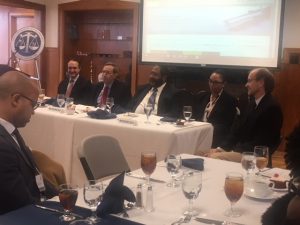Student Summary: Tam
Summary from a Student: IIPSJ Roundtable: The Aftermath of In re Tam
- Alexis Harrison, rising 2L, Howard University School of Law
This panel discussion included the following speakers; Phillip Hampton, senior counsel at Haynes & Boone  LLP; Toni Hickey, Deputy General Counsel & Chief IP Counsel at Cummins, Inc.; William Thomashower, counsel at Pryor Cashman LLP and; Douglas A. Rettew, partner at Finnegan, Henderson, Farabow, Garrett & Dunner, LLP. It was moderated by Stephen McJohn, a professor at Suffolk University School of Law. The discussion centered around the implications arising from the holding of In Re Tam. Here the Court reversed its course, holding that it is unconstitutional for the Patent and Trademark Office to deny the registration of disparaging content. Attorney Thomashower compared the effect of the opinion to the opening of the Pandora’s box. He is also concerned that the opinion made no mention of a chilling effect in disallowing disparaging content from being registered, while still permitting its use. Another critique found it unfortunate that the Court also did not mention the level of scrutiny used in the opinion.
LLP; Toni Hickey, Deputy General Counsel & Chief IP Counsel at Cummins, Inc.; William Thomashower, counsel at Pryor Cashman LLP and; Douglas A. Rettew, partner at Finnegan, Henderson, Farabow, Garrett & Dunner, LLP. It was moderated by Stephen McJohn, a professor at Suffolk University School of Law. The discussion centered around the implications arising from the holding of In Re Tam. Here the Court reversed its course, holding that it is unconstitutional for the Patent and Trademark Office to deny the registration of disparaging content. Attorney Thomashower compared the effect of the opinion to the opening of the Pandora’s box. He is also concerned that the opinion made no mention of a chilling effect in disallowing disparaging content from being registered, while still permitting its use. Another critique found it unfortunate that the Court also did not mention the level of scrutiny used in the opinion.
Another effect described is the registration of distasteful content in order to limit their use and abuse by other inciting or hateful groups. However, attorney Hickey countered that this would pose a difficult challenge for communities and populations of people that do not have the financial resources to pursue this method of reclaiming distasteful or hateful content. Additionally, attorney Hickey described the impact of the opinion for the average citizen. There is no longer a reliable standard for citizens to consider in determining immoral content.
When asked to consider legislative solutions to the opinion, the panelists concluded that a fix from this branch of government is unlikely and erroneous. Instead, attorney Thomashower described the role of the courts. The objective test should be applied by judges to determine the standard for disparaging content. This is not censorship he argued, because the government has a genuine interest in restricting the registration of content which could lead to a dangerous or inciting result. Nonetheless, attorney Hampton emphasized that the Trademark Office is still pretty conservative, and thus there is an initial layer of bias with the examiners.
